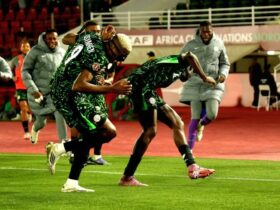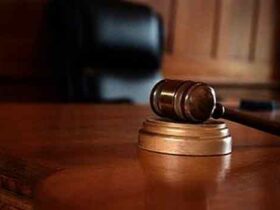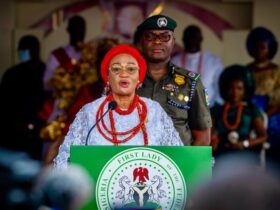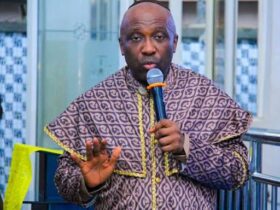The then INEC President – elect, in the course of his inaugural speech on May 29, 2023, made an announcement that fuel subsidies were no longer sustainable in Nigeria. Subsequently, on June 9, 2023, he had a meeting with Mr Mele Kyari, the GCEO of the Nigerian National Petroleum Company Limited (NNPCL), and Godwin Emefiele, the CBN Boss.
Immediately the meeting was over, the suspension of Emefiele was announced. What followed on June 10, 2023, was unverified news about his arrest by the Secret Police and DSS. At first, the DSS denied his arrest; but within a couple of hours, its spokesperson, Peter Afunanya, tweeted thus, “The Department of State Services (DSS) hereby confirms that Mr Godwin Emefiele, the suspended Governor of the Central Bank of Nigeria (CBN), is now in its custody for some investigative reasons.”
Afunanya did not provide details of when and how Mr Emefiele was arrested and where he was being kept. It was however gathered that, the banker was picked up from his home in Lagos and then flown to Abuja, guarded by a detachment of operatives. Thereafter, he was driven to the SSS’ headquarters in the Asokoro District of the nation’s capital. Seeing a whole CBN Governor in chains being led like a common criminal is indeed a national disgrace and scandal. I was greatly embarrassed as a Nigerian.
EMEFIELE HEADS BACK TO COURT
Consequently, Emefiele instituted a rights action against the DSS. Delivering judgement, Justice Muazu, held that Emefiele’s continued detention without trial, amounts to a gross violation of his fundamental human rights; but however, that Emefiele failed to prove that his arrest, detention and investigation were unlawful since they were based on a valid court order. Justice Muazu said:
“Detention, no matter how small, can amount to a breach of fundamental rights, “Though I am in sympathy with the applicant (Emefiele), but my sentiment will not go far to deliver judgement by granting all the reliefs sought by the applicant”.
“The applicant has not shown that his arrest, detention and investigation were unlawful. “However, I am concerned that the application is not without merit. The applicant is entitled to fair hearing”.
“At this point, the continued detention of the applicant cannot be justified in the absence of any charge against him”.
“Consequently, I hereby make an order, directing the respondents to within one week, charge the applicant to court or release him on administrative bail.”
Yet again, following another application, Justice Kawu also made an order setting aside any purported warrant of arrest obtained or procured by the Respondents, especially the DSS, for the arrest of Emefiele in connection with the allegations of terrorism financing, fraudulent practices, money laundering, threat to national security, before any court.
The court further granted an injunction restraining the respondents, particularly the DSS from arresting, detaining, or interfering with Mr. Emefiele’s personal liberty and freedom of movement; and that he is released from detention.
THE SUDDEN NEW CHARGES AGAINST EMEFIELE: AN AFTERTHOUGHT?
Like a Fandango, the DSS subsequently switched the charges levied against Emefiele to mere illegal possession of unlawful arms. He was accused of illegally possessing a single-barrel shotgun (JOJEFF MAGNUM 8371) without license. On Tuesday, July 25, Emefiele pleaded not guilty to a two-count charge filed against him, before a Federal High Court in Lagos State.
The bail application by Emefiele succeeded, irrespective of the opposition of the Federal government.
In his ruling, Justice Nicholas Oweibo, the presiding Judge, said the charges against Emefiele are bailable. He granted Emefiele bail.
The presiding Judge however ruled that the surety must have landed property within the jurisdiction of the court and must depose to an affidavit of means. Emefiele was also asked to deposit his international passport with the court registry.
The Judge also ruled that the CBN governor should be remanded in the correctional centre, pending perfection of his bail conditions. The case was then adjourned to November 14, 2023 for continuation.
THE GANSTERISM OF THE DSS IN A LAWLESS ERA
The operatives of the Department of State Services (DSS), re-arrested Emefiele, in the premises of the Federal High Court, Lagos, few hours after he was granted bail by Justice Nicholas Oweibo. The days of the locusts are here once again!
The attempt at re-arrest caused a cacophony when Emefiele came out of the courtroom, led by a Squadron Commander from the Nigerian Correctional Service (NCoS). The NCoS was promptly intercepted by DSS operatives, which caused the retreat of Emefiele back into the courtroom.
This happened while Emefiele’s lawyers were busy perfecting his bail conditions. Ruckus ensued when a DSS personnel engaged in fisticuffs over who should take custody of the former CBN governor. It became a fight, as the DSS officers beat up the NCoS Squadron Commander, when he made an attempt to resist DSS from taking Emefiele away from him. He was thoroughly manhandled, his clothes torn.
The situation became so messy and ugly that both the DSS personnel and the NCoS officers corked their guns and were ready to shoot, as court workers and journalists scampered for safety. However, the NCoS retreated following immediate direction from the Controller-General of the NCoS in Abuja. Supposing they had shot live bullets and Judges, litigants, members of the public and operatives of the DSS and NCoS got killed, what next? I do not know. Or, do you?
All this madness took place after the learned trial Judge had directed that custody of Emefiele should be in the correctional centre and not with the DSS. Many Nigerians appreciated this serious situation, but made a mockery of the whole system. Others however trivialized it by concluding that Emefiele’s custody was important because “them know say anywhere him lap, joy go touch boys”. Nigerians!!!
EARLIER CHARGES
The earlier allegations against Emefiele but which were never pursued revolved around some legislations. Terrorism (Prevention and Prohibition) Act, 2022. These have to do with terrorism financing, which under various sections carries sentences ranging from fine to life imprisonment and 20 years imprisonment; and up to winding up a company that is involved.
On the other hand, the Robbery and Fire Arms (Special Provisions) Act, in section 3, and section 428 of the Criminal Code Act, provides for punishment for illegal possession of firearms to a fine and less than 10 years imprisonment.
THE RE-ARREST CULTURE BY NIGERIAN LAW ENFORCEMENT AGENCIES
One of the commonplace routines by law enforcement agencies in Nigeria, which is gradually snowballing into an established culture is the act of arresting an accused person immediately after being granted bail by a Court of competent jurisdiction. This may be seen as a practice to prevent the defendant from disappearing into thin air. But, is this the whole truth behind these sharp, illegal and unethical practices? I answer in the negative, No! What about you?
WHAT DOES THE LAW SAY?
Truth is that these unwholesome acts arise due to the ineffective and inefficient machinery, investigative measures and mechanisms prevailing in the various agencies.
It is pitiable that our criminal investigative departments have since imbibed the culture of lack of diligence and dexterity, resulting to illegal practices and violations of the fundamental rights of citizens. This makes mockery of constitutional safeguards. The culture of arrest before investigation runs contrary to so many fundamental principles of human rights in the Administration of Criminal Justice. Odemwingie Uwaifo JSC (as then was), in Fawehinmi v. IGP (2002) 7 NWLR 606 at 681, said, “In a proper investigation procedure, it is unlawful to arrest unless there is sufficient evidence upon which to charge and caution a suspect. It is completely wrong to arrest, let alone caution a suspect, before the police look for evidence implicating him.”
In NDLEA & Ors v. Bwala (2022) LPELR-56566(CA), on whether arrest and detention before investigation is unconstitutional, Justice FOLASADE AYODEJI OJO, JCA (Pp 26 – 27 Paras F – C), held:
“It has been settled in a line of judicial authorities that it is unlawful to arrest a person until there is sufficient evidence to charge and caution him and that it is unconstitutional to arrest a person pending investigation. In other words, it is unlawful to arrest a person when investigation of the alleged crime is still on and there is no prima facie evidence that the suspect has committed the offence or reasonable suspicion that he has done so. Arrest and detention before investigation is unconstitutional. See FAWEHINMI VS. INSPECTOR-GENERAL OF POLICE (2002) 7 NWLR (PT. 767)606, DURUAKU VS. NWOKE (2015) 15 NWLR (PT. 1483) 417 AND OGOR VS. ROLAND & COMMISSIONER OF POLICE (1983) 1 NCR 343.”
EMEFIELE’S RE-ARREST AFTER THE COURT ORDERED HIS RELEASE: THE LEGAL REGIME
It was gathered that, after Emefiele was granted bail on terms, and his lawyers were perfecting the bail conditions, upon stepping out of the Court room, he was apprehended and arrested again for fresh charges by men of the DSS. Like they always do, he may now be charged with an entirely fresh set of offences, even without prior investigation of same. What kind of piecemeal prosecution (sorry, persecution) is this? Is this how to run a country governed by constitutional safeguards? I believe not. Or, do you think so?
In Military Governor of Lagos State v. Ojukwu (2001) FWLR (Pt. 50) 1779 at 1801, on the Rule of Law—Supremacy of Law and the need for government to conduct its affairs with regards to the law, the Supreme Court, per Andrews Atutu Obaseki, JSC (as he then was), had this to say:
“The Nigerian Constitution is founded on the rule of law the primary meaning of which is that everything must be done according to law. It means also that government should be conducted within the frame-work of recognized rules and principles which restrict discretionary power which Coke colourfully spoke of as ‘golden and straight method of law as opposed to the uncertain and crooked cord of discretion’ (see 4 Inst. 41). More relevant to the case in hand, the rule of law means that disputes as to the legality of acts of government are to be decided by judges who are wholly independent of the executive. See Wade on Administrative Law 5th Edition p. 22-27. That is the position in this country where the judiciary has been made independent of the executive by the Constitution of the Federal Republic of Nigeria 1979 as amended by Decree No. 1 of 1984 and No. 17 of 1985.
The judiciary cannot shirk its sacred responsibility to the nation to maintain the rule of law. It is both in the interest of the government and all persons in Nigeria. The law should be even handed between the government and citizens.”
In UBA PLC & Ors v. Durunna (2015) LPELR-25625(CA), Frederick Ozoakpono Oho, JCA, said, “…this practice of making arrests first before looking for evidence in a manner of speaking is like placing the “cart before the horse” instead of doing it the other way round…”
The subsequent re-arrest and detention of Emefiele is in utter disobedience of the Court order granting bail to Emefiele. For how long, shall we continue to tolerate law enforcement agencies that thrive on the imprimatur of executive lawlessness? For how long? Why can they not learn to obey court orders under our tripartite separation of powers, doctrine popularized in 1748 by leading French Philosopher, Baron de Montesquieu?
In AKINYEMI v. SOYANWO & ANOR (2006) LPELR-363(SC), on whether an order of court must be obeyed, FRANCIS FEDODE TABAI, JSC, at Pp 15 – 15 Paras C – E, had this to say:
“It is a settled principle of law that every party to a suit, and indeed every citizen, has an obligation to obey the subsisting Court decision or order in the suit unless and until it is set aside. And the party’s obligation to obey the decision is without regard to his perception about the irregularity or illegality of the decision as long as it subsists. See Alhaji Audu Shugaba v. Union Bank of Nigeria Plc. (1999) 11NWLR (Pt. 627) 459 at 477 where this principle was re-enacted. See Odogwu v. Odogwu (1992) 2 NWLR (Pt. 225) 539; Nigerian Army v. Gloria Mowarin (1992) 4 NWLR (Pt. 235) 345.”
In OKEKE V. IGP & Ors (2022) LPELR-58476(CA), pronouncing on whether the Police can deprive citizens of their liberty while the case against them is still being investigated, CHIOMA EGONDU NWOSU-IHEME, JCA at Pp 9 – 9 Paras D – E, echoed:
“The law does not give the Police unbridled power to deprive citizens of their liberty while the case against them is still being investigated. See EVANGELIST BAYO JOHNSON V. E. A. LUFADEJU & ANOR (2002) 8 NWLR (PT. 768) PG 192 at 218 B – C.”
CONCLUSION
It is clear to me that Mr. Godwin Emefiele’s rights have been grossly and wantonly violated with impunity under the thin guise of investigation. What manner of investigation? The order of the Court granting him bail has since been rendered futile by his subsequent re-arrest and detention. The DSS’ wanton acts of brigandage throws us back into the ignoble Hobbesian State of Nature, where life was short, solitary, nasty and brutish. So disgusting. So shameful. So horrific.
Godwin Emefiele’s offences (and Bawa’s, if any), as already charged, are bailable (see sections 35 and 36 of the 1999 Constitution as amended). As regards Bawa’s alleged offences, we still do not even know till date. By the way, who is afraid of Emefiele? And who is afraid of Bawa? And why? I do not know. Or, do you? Both Emefiele and Bawa have presumption of innocence enuring in their favour (section 36(5) of the 1999 Constitution as amended). See DAUDA V. FRN (2018) 10 NWLR (pt. 1616) 169 and NKIE v. FRN (2014) LPELR-22877 (SC). Two options are available here to this wobbly and fumbling government that is fast donning the garb of military (sorry, civilian) dictatorship and absolutism: charge Emefiele and Bawa to court; or RELEASE them promptly and unconditionally. Please, sirs/mas, let my people go. Let Emefiele and Bawa go (Exodus 8:1).









Leave a Reply